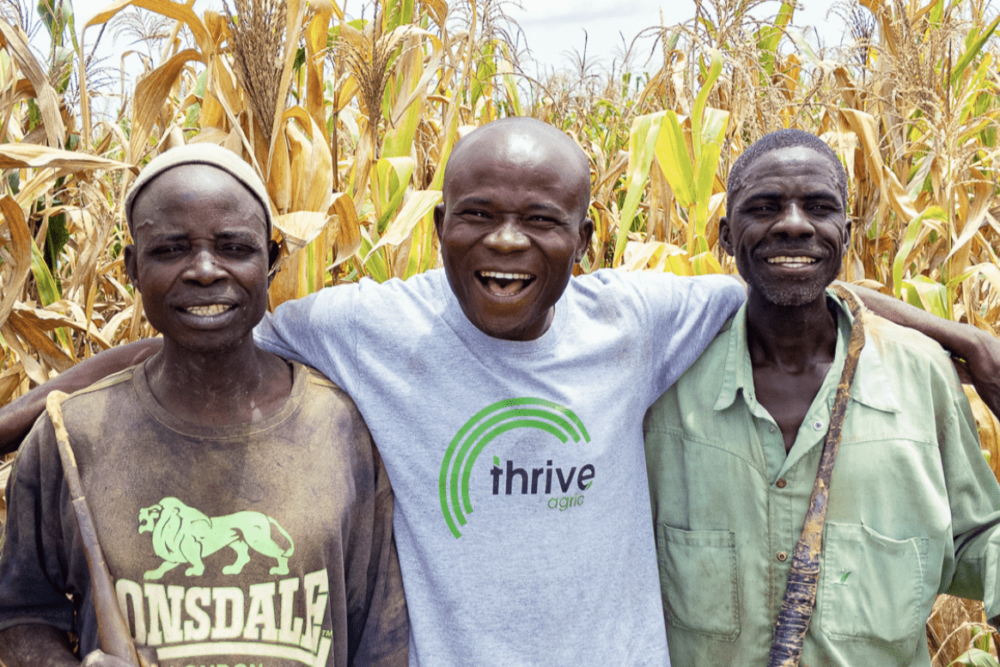Two African agritech startups secured close to $100 million in financing between them this week in a watershed moment for the continent’s agrifoodtech scene.
- Kenya’s Apollo Agriculture, which helps small-scale farmers maximize their profits by providing them with advice, financing, farm inputs, insurance, and market access, raised $40 million. The Series B equity investment was led by Softbank Vision Fund 2. Existing investors including Anthemis Exponential Ventures, Flourish Ventures, Leaps by Bayer, SBI Breyer Capital, and TO Ventures Food also participated alongside new investors such as Yara Growth Ventures, Endeavor Catalyst, CDC Group, and the Chan Zuckerberg Initiative.
- Meanwhile, Nigeria’s ThriveAgric received $56.4 million in debt financing. Following the $9 million the startup raised in 2020, this latest capital injection comes from institutional investors and includes a $1.75 million co-investment grant from USAID-funded West Africa Trade & Investment Hub as support for its continued commitment to strengthening agricultural value chains in Nigeria.
Why it matters:
This volume of funding, massive by historical African standards, is indicative of the growing investor interest in supporting the continent’s smallholder ecosystem.
- Apollo Agriculture plans to use the funds it has raised to double the number of farmers it serves this year, while also expanding the portfolio of services it offers them.
- ThriveAgric is looking to expand to more African countries to build on its existing 200,000-plus farmer base.
The big picture:
Supporting smallholder farmers in Africa can reap huge benefits; they account for around 60% of the continent’s population. However, they face myriad challenges which keep their productivity low; many are based in remote areas that are difficult to access, while low earnings means that better-quality inputs that could boost yields are not affordable for them.
Throughout Africa, access to insurance and financing is a glaring challenge for smallholders, as many are ‘unbanked’ and traditional financial institutions typically lack the capacity to develop innovative financial services and products to serve them and the wider agriculture sector.
McKinsey argues that Africa could produce up to three times as much cereal and grain — adding 20% to global output — than it does at the moment if it could increase fertilizer use by 8x and improved seed use by 6x, alongside investments of $8 billion into non-cold chain storage and $65 billion into irrigation.
How it works:
Increasing smallholder productivity is the main goal for both Apollo Agriculture and ThriveAgric. They primarily focus on input financing, accompanying it with supporting services such as agronomic advice.
Apollo Agriculture also offers its users insurance through partnerships with the likes of Kenyan startup Pula, as well as access to markets for selling their produce.
- Since the farmers it targets often lack a financial history, Apollo Agriculture leverages machine learning models to predict a farm’s yield – which in turn is used to predict a farmer’s credit risk. Lending is also linked to the farm’s size, and satellite imagery is used to monitor them remotely.
- Farmers interact with Apollo Agriculture via SMS and apply for financing, after which an agent is designated to assess their farm. Once approved, the farmer gets a voucher which they use to pick up supplies from the nearest agro-dealer.
ThriveAgric enables farmers to sell their produce to FMCG companies and food processors, leveraging technology to help them access finance and boost their productivity.
- After onboarding, ThriveAgric inspects farms to gauge their viability. Then farmers can get financed fertilizers, seeds, and crop protection products.
- ThriveAgric monitors the progress of its users’ farms through field officers, who provide farmers with advisory services.
Apollo Agriculture by the numbers:
- Year founded: 2016
- Over 100,000 farmers financed by 2021
- 10x revenue growth since 2020
ThriveAgric by the numbers:
- Year founded: 2017
- Over 200,000 farmers onboarded to date
- 5x revenue growth over past 12 months
- 277% year-on-year increase in farmer users
Competitive landscape:
Similar startups helping farmers access financing, inputs, and markets in Africa include:
What they’re saying:
Uka Eje, co-founder and CEO, ThriveAgric
“The new investment takes us one step closer to fulfilling our mission of building the largest network of profitable African farmers using technology, to ensure food security. Despite a volatile backdrop over the past few years, brought about by the global pandemic […] we were able to overcome those challenges within a year and maintained company profitability. Our solid financial performance underscores investors’ faith in ThriveAgric.”
Ayo Arikawe, co-founder and chief technology officer, ThriveAgric
“ThriveAgric’s fundraising objectives are geared towards growth through vertical and horizontal integration. One of our goals is to be able to widen access to markets for our smallholder farmers, help to lift them out of poverty, and ultimately promote food security. We do this by enabling them to take their produce to local and international markets.”
Benjamin Njenga, co-founder and chief customer officer, Apollo Agriculture





